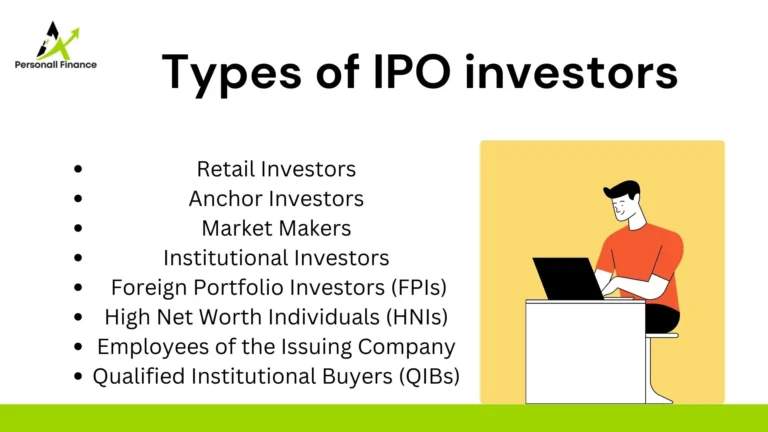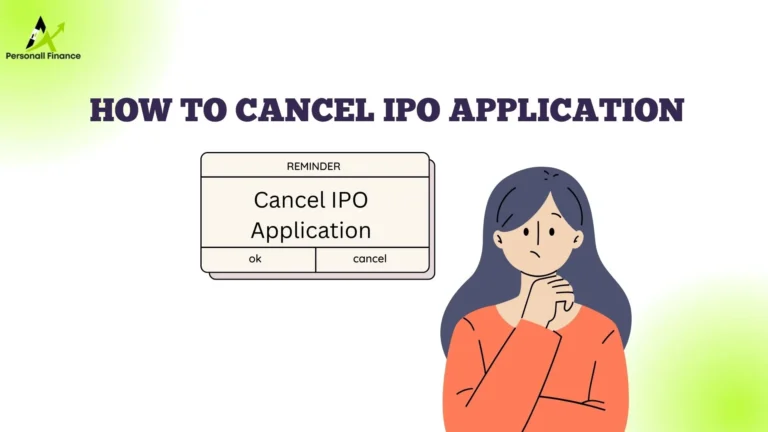Introduction
Let’s explore the Types of investors in the broad landscape of Initial Public Offering (IPO) within the Indian market. In this exploration, we will break down the key categories of participants, each with different motivations and impact on the IPO ecosystem.
These investors include a wide range ranging of individual retail investors to influential institutional players, shaping the path of companies entering the public domain. Let’s go on this journey to understand their roles and dynamics inside the Indian Initial Public Offering landscape

Let's explore the types of investors in an (IPO) and stock market
1. Retail Investors
- Retail investors are individual investors who participate in IPOs with the intention of buying shares for personal investment.
- They often invest small amounts compared to institutional investors.
- In India, retail investors enjoy special benefits like a reserved quota and discounted pricing in some IPOs.
2. Institutional Investors
- Institutional investors include mutual funds, insurance companies, pension funds, and other financial institutions.
- They invest large sums of money in IPOs and play a significant role in determining the success of an offering.
- Institutional investors conduct thorough due diligence before investing.
3. High Net Worth Individuals (HNIs)
- HNIs are individuals with a significant net worth, and they often invest significant amounts in IPOs.
- They may apply for shares both in the retail and non-institutional categories.
- HNIs often get special treatment and may get a larger share allocation.
4. Employees of the Issuing Company
- Employees of the company going public may receive shares at a discounted price or as part of their compensation.
- They may choose to hold or sell their shares once the company is listed.
5. Qualified Institutional Buyers (QIBs)
- QIBs are a category of institutional investors that meet certain eligibility criteria.
- They include foreign institutional investors (FIIs), banks, and financial institutions.
- QIBs often invest substantial sums in IPOs and play an important role in the overall subscription.
6. Anchor Investors
- Anchor investor means a group of QIBs who invest in the IPO before the public offering opens.
- Their investments are meant to boost confidence in the IPO and set a price benchmark.
- Anchor investors typically hold their shares for a specified lock-in period
7. Market Makers
- Market makers are entities that help trading in the secondary market by providing liquidity.
- They may also participate in Initial Public Offering to ensure smooth trading post-listing.
8. Foreign Portfolio Investors (FPIs)
- FPIs, also known as foreign institutional investors (FIIs), are non-Indian entities that invest in Indian securities.
- They participate in Indian IPOs, often in the QIB category.
Conclusion
These are the main categories of investors who invest in IPOs in India. Each category has its own investment strategy and objectives, and their collective participation plays an important role in the success of an Initial Public Offering and the subsequent performance of the listed company’s shares.
Frequently Asked Questions (FAQ)
IPOs attract a wide range of investors, including individual retail investors, institutional investors, and high-net-worth individuals.
Not always, but it’s common for employees to have the choice to invest in the IPO at a discounted price. Their participation can signify confidence in the company’s future.
Underwriters, as financial intermediaries, help determine the IPO price and allocation of shares. To ensure the success of the offering, they might give institutional and the foundation investors priority.
Factors include the company’s financial health, growth potential, industry trends, market conditions, and the perceived valuation of the IPO.
Yes, like any investment, IPOs carry risks. The stock price can be highly volatile in the early days after the offering, and investors may not realize immediate gains.



